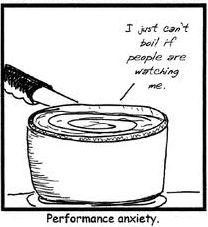When I was seventeen my mother tried to teach me how to drive a stick shift. We both failed spectacularly. After an hour or more in the parking lot she gave up and asked her husband to give it a go. In less than five minutes I was driving beautifully. I’ve thought about this experience a lot in the intervening years. Was he just lucky to be sitting shot gun when the pieces clicked for me? Or was there something about my interactions with my mother that interfered with my learning?
The answer is probably is rooted psychological concepts known as performance orientation versus learning orientation. Performance orientation can be of two types – being interested in gaining positive or avoiding negative evaluations of performance. This is in contrast with a learning (or mastery) orientation, in which people’s focus is on skill development. With a performance orientation, the criteria for “success” depends on other people’s assessments, whereas someone with a learning orientation uses their own experience as the referent. Further, those with a performance orientation see ability as fixed, and those with a learning orientation see it as changeable and under their control.
Understanding these differences isn’t just an academic exercise. It is useful because they lead to different outcomes. For example, when dealing with failure, people with a learning orientation tend to react positively, seeing it as an opportunity for growth. But since those with a performance orientation tend to see ability as a constant, they see failure as proof of their inability and react to it negatively. Having a learning goal orientation also leads to improved performance, because when you believe that ability is malleable, you have greater belief in your ability to achieve your goals, leading to greater effort and more strategic action. In fact, it’s this belief in your ability to succeed that creates a daisy chain toward success – if someone with a performance orientation believes they have high ability relevant to a task, their behavior and outcomes are similar to those with a learning orientation.
While researchers have found there is a stable, dispositional aspect to goal orientation, there are situational aspects as well. And since they are separate constructs, not two different ends of a single continuum, in a given situation you could have both performance and learning goals to varying degrees. While I probably tend toward a learning goal orientation, in the case of stick-shift lesson, I had a stronger desire to perform for my mother, which actually interfered with my ability to do so.
Think about the last time you were called on to “perform.” Maybe it was an important presentation to a team of executives, or a tough sales call with a potential client known to be shopping around. Some situation where it was imperative that you perform at a high level. You probably spent a significant portion of your energy worrying about how the others were perceiving you, whether things would work out in your favor, what could go wrong, whether you had what it took to succeed – cognitive effort that you weren’t bringing to bear on the actual task. Focusing too much on performance evaluations can actually impair performance.
But wait! We want to be high performers in high-performing organizations! Of course we have performance goals! How can that be a bad thing? And it’s not a bad thing – it’s normal and often appropriate. But in order really maximize our performance, especially in this day and age, we need to be able to continually expand our skills and abilities. Just like in innovation, there is a time for open-ended creativity and a time to switch gears to implementation. There’s a time to focus on learning and development, and a time to confidently leverage those skills. We need to be able to more consciously and flexibly set and manage our goals.
As a manager, think about the situational cues you provide when giving feedback or during regular performance reviews. Are you focusing your people on how they can improve, or causing them to obsess over pleasing you or avoid your wrath? As an individual contributor, being aware of your orientation is highly relevant to your career trajectory. We are increasingly responsible for forging our own path and developing our own skill set. Taking ownership of our development and approaching experiences with the goal of getting the most growth out of them serves you better than being overly concerned with how you’re evaluated by others. We have talked repeatedly about human’s immense capacity to grow and change. The first step toward harnessing that power is to recognize that your own beliefs might be your greatest limitation.
“Whether you think you can, or you think you can’t–you’re right.” –Henry Ford
Need help with gaining insight into yourself, your team, and your organization to better align and drive performance? Check out our solutions at
https://www.performanceinsightllc.com/solutions.html
Get in touch with us using the form below or by contacting us at info@performanceinsightllc.com
[contact-form-7 404 "Not Found"]
